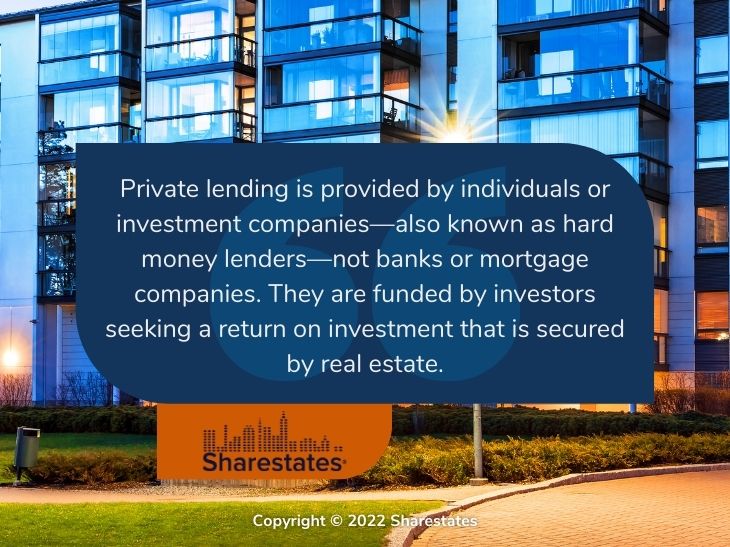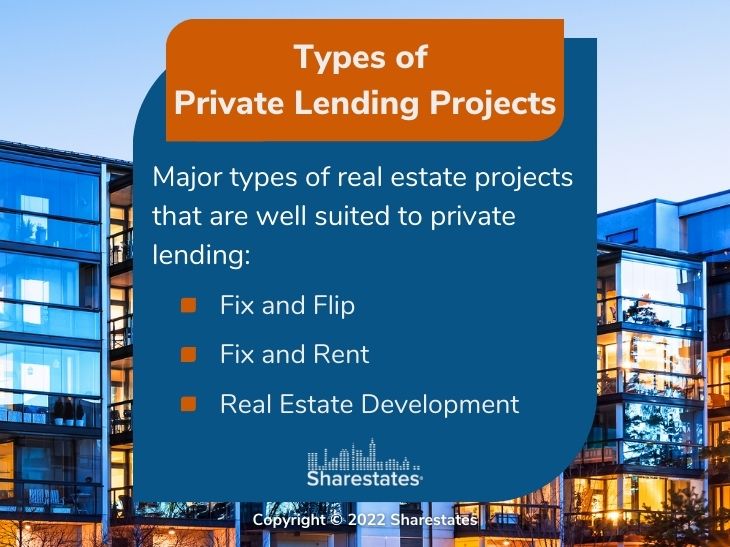Private loans are an excellent source of funding for your real estate projects. They are usually quite a bit more attractive than bank loans. And, in fact, they may be the only type of loan available for some projects.
In this article, we define private lending, identify the types of projects best suited to private lending, and briefly address how to get private real estate loans.
What Is Private Lending?
Private lending is provided by individuals or investment companies, not banks or mortgage companies. These companies, also known as hard money lenders, are funded by investors seeking a return on investment that is secured by real estate. On the other hand, individuals are just that, often they are family and friends with the funds to invest in a worthwhile project.
The advantage of private lending is that it brings a great deal of flexibility that banks couldn’t possibly offer. That includes an easier and quicker qualification process, a simple application process, lower closing costs, and flexible repayment terms.

With individual lenders, depending on your relationship, the terms can be very flexible. With hard money lending organizations, they’ll have more loan criteria as well as quite possibly higher closing costs and interest payments. Even so, they still offer significant advantages over traditional bank loans.
Types of Private Lending Projects
There are quite a few real estate projects that are well suited to private lending. Here are the major types.
- Fix and Flip. This is when the borrower purchases a home in need of repair and updates. They then invest time and effort fixing it up prior to reselling it. Banks will seldom consider providing a loan for a home in poor condition. That means that private investors are the perfect option to finance both the purchase and the cost of fixing the home.
- Fix and Rent. In this case, the borrower is seeking a long-term return with monthly cash flow. Just as in the fix and flip option, banks aren’t often interested in loaning money for a rundown property. Private lending can provide flexible funding for the purchase and repair of the property. It can also do so cost-effectively.
- Real Estate Development. Purchasing vacant land and developing it into commercial or residential property is seldom of interest to banks. Instead, private lenders will be able to consider all aspects of evaluating the potential return and setting the appropriate rates and terms. They can also provide bridge loans. See our article Bridge Financing and Term Loans Explained for further background.

How to Get a Private Real Estate Loan
As noted, private real estate loans are known for their flexibility in meeting the needs of both borrowers and lenders. So, there’s no one best way to find a private real estate loan. However, there are a few key steps you should follow to make sure you find the lender that is right for you and your real estate project.
- Develop a business plan. Take the time to document your overall plans, paying particularly close attention to the financial aspects. Such a plan, however simple in structure, can help guide your efforts. It can also demonstrate to prospective lenders that you have a serious business and, as a result, are a sound investment. It’s also the primary starting point for any application process.
- Document your previous projects. Building a short summary for each of your previous projects can demonstrate to any private lender that you have the experience needed to be successful. The summaries don’t have to be too detailed. Photos, timelines, and financial results will help your application.
- Build a network. This can help you find others in the same business who can offer insight into available lenders. Network building should also include family members, friends, and even acquaintances who can either serve as lenders or recommend others who can provide funding.
- Research available lenders. It’s critical that you find a private lender that matches your needs. They, in essence, are becoming your business partner. Not only that, but as you grow your business you want them available for the next projects. Your research should also include reviews and ratings from others. It’s also wise to seek out those in your network who have worked with one or more prospective lenders.
- Contact the lender. After all that research and work, it’s time to contact the lender and get started on the application process. But don’t move out of the research and evaluation stage just yet. During the application process note the lender’s response rate, their overall approach, and if they are really interested in your business. If things don’t feel right, they often aren’t right.
- Sign the paperwork. Once all that’s been accomplished it’s time to sign all the documents and move forward with your project. Congratulations.

For further background see our article Pros and Cons of Private Real Estate Loans.
We hope this brief review has helped provide insight into private real estate loans. To learn more about getting funding for your business through Sharestates, click here.


